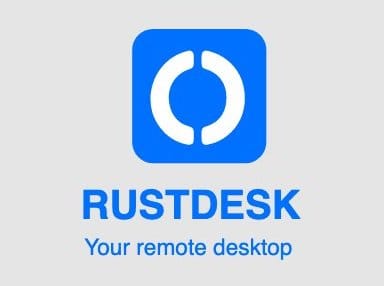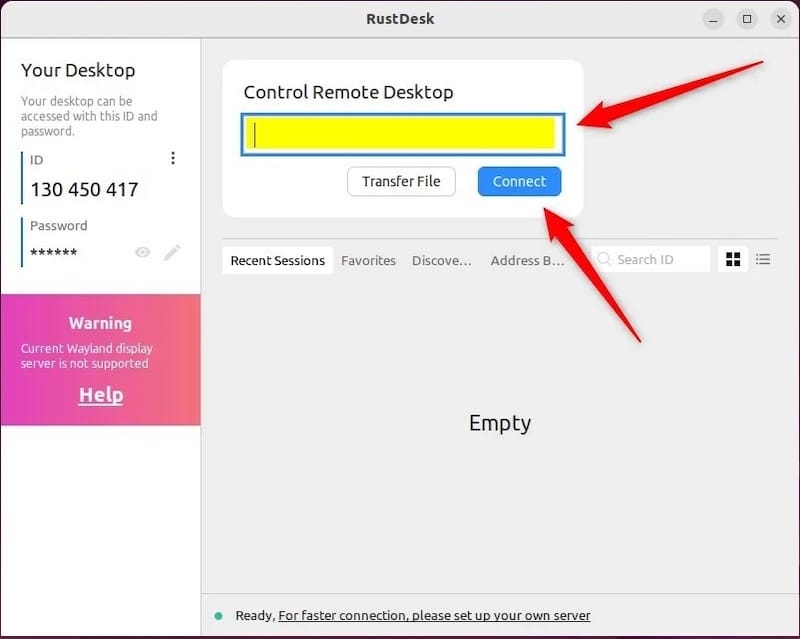How To Install RustDesk on Debian 12

RustDesk stands out in the crowded field of remote desktop applications for several reasons. As an open-source solution, it offers transparency and customizability that proprietary software often lacks. Its cross-platform support means you can connect to your Debian 12 system from various devices, including Windows, macOS, and mobile platforms. Moreover, RustDesk’s focus on security makes it an attractive option for those concerned about privacy and data protection.
By choosing RustDesk for your remote desktop needs on Debian 12, you’re opting for a flexible, secure, and community-driven solution. Whether you’re managing servers, providing remote support, or simply accessing your home computer from afar, RustDesk offers a comprehensive set of tools to meet your needs.
Prerequisites
Before diving into the installation process, it’s crucial to ensure your Debian 12 system meets the necessary requirements and is properly configured. Here’s what you’ll need:
- A Debian 12 (Bookworm) system with at least 2GB of RAM and 20GB of free disk space
- An active internet connection
- Sudo privileges on your Debian system
- Docker and Docker Compose installed (we’ll cover this in the next section)
- Open ports: 21115-21119 (TCP/UDP)
To ensure smooth operation, you’ll need to configure your firewall to allow traffic on the required ports. If you’re using UFW (Uncomplicated Firewall), you can open these ports with the following commands:
sudo ufw allow 21115:21119/tcp
sudo ufw allow 21115:21119/udp
sudo ufw reload
If you haven’t already installed Docker and Docker Compose, you can do so with these commands:
# Install Docker
sudo apt update
sudo apt install docker.io
# Install Docker Compose
sudo apt install docker-compose
# Add your user to the docker group (log out and back in after this)
sudo usermod -aG docker $USER
Server-Side Installation
The RustDesk server consists of two main components: hbbs (RustDesk ID/Rendezvous server) and hbbr (RustDesk relay server). We’ll use Docker to set up these components, ensuring a clean and easily manageable installation.
Creating the Directory Structure
First, let’s create a directory to store our RustDesk server configuration:
mkdir -p ~/rustdesk-server/data
cd ~/rustdesk-server
Configuring the Docker Environment
Create a docker-compose.yml file in the rustdesk-server directory with the following content:
version: '3'
services:
hbbs:
container_name: hbbs
image: rustdesk/rustdesk-server:latest
command: hbbs -r rustdesk.example.com:21117
ports:
- 21115:21115
- 21116:21116
- 21118:21118
volumes:
- ./data:/root
restart: unless-stopped
hbbr:
container_name: hbbr
image: rustdesk/rustdesk-server:latest
command: hbbr
ports:
- 21117:21117
- 21119:21119
volumes:
- ./data:/root
restart: unless-stopped
Replace rustdesk.example.com with your server’s public IP address or domain name.
Installing RustDesk Server Components
With the Docker Compose configuration in place, you can now start the RustDesk server components:
docker-compose up -d
This command will pull the necessary Docker images and start the hbbs and hbbr services in detached mode.
Firewall Configuration and Port Forwarding
If your Debian 12 system is behind a router, you’ll need to set up port forwarding for the following ports:
- 21115-21119 (TCP)
- 21115-21119 (UDP)
Consult your router’s documentation for specific instructions on port forwarding.
Client Installation Process
With the server components up and running, let’s move on to installing the RustDesk client on your Debian 12 system.
Downloading the RustDesk Client Package
Visit the official RustDesk GitHub releases page to download the latest Debian package:
wget https://github.com/rustdesk/rustdesk/releases/download/1.3.3/rustdesk-1.3.3-x86_64.deb
Replace 1.3.3 with the latest version number available at the time of installation.
Installation Methods
You have two options for installing the RustDesk client:
APT Package Manager Installation
If you prefer using the APT package manager, follow these steps:
sudo apt update
sudo apt install ./rustdesk-1.3.3-x86_64.deb
Manual DEB Package Installation
Alternatively, you can use the dpkg command for manual installation:
sudo dpkg -i rustdesk-1.3.3-x86_64.deb
sudo apt-get install -f # Install any missing dependencies
Post-installation Configuration
After installation, you can launch RustDesk from the application menu or by running rustdesk in the terminal. On first launch, you’ll need to configure the client to connect to your self-hosted server.

Configuration and Setup
Proper configuration is crucial for ensuring a secure and efficient remote desktop experience with RustDesk on Debian 12.
Network Settings Configuration
Open RustDesk and navigate to the settings menu. Under the “Network” tab, you’ll find options to configure your connection preferences:
- Set the “ID/Relay Server” to your server’s IP address or domain name
- Ensure the correct ports are specified (21115-21119)
- Choose between UDP and TCP protocols based on your network requirements
Server Connection Setup
To connect your RustDesk client to your self-hosted server:
- Open RustDesk settings
- Navigate to the “ID/Relay Server” section
- Enter your server’s IP address or domain name
- Click “Apply” to save the changes
Security Configurations
RustDesk offers several security features to protect your remote connections:
- Enable two-factor authentication for an extra layer of security
- Set up a strong password for accessing your Debian 12 system remotely
- Configure IP whitelisting to restrict access to trusted networks
Authentication Setup
To secure your RustDesk connections:
- Go to RustDesk settings
- Navigate to the “Security” tab
- Set a strong password for remote access
- Enable additional security features as needed
Advanced Configuration
For power users and administrators, RustDesk offers advanced configuration options to fine-tune your remote desktop experience on Debian 12.
Custom ID Configuration
You can set a custom ID for your Debian 12 system to make it easier to remember and connect:
rustdesk --set-id your-custom-id
Password Protection Setup
To set or change the password for unattended access:
rustdesk --set-password your-secure-password
Command-line Parameters
RustDesk supports various command-line parameters for advanced users:
--password: Set a new password--config-file: Specify a custom configuration file--log-level: Set the logging verbosity
Performance Optimization
To optimize RustDesk performance on Debian 12:
- Adjust video quality settings based on your network speed
- Enable hardware acceleration if supported by your GPU
- Configure custom keyboard shortcuts for efficient navigation
Troubleshooting Guide
Even with careful installation and configuration, you may encounter issues. Here are some common problems and their solutions:
Connection Issues
If you’re having trouble connecting to your Debian 12 system:
- Verify that the RustDesk server components (hbbs and hbbr) are running
- Check your firewall settings to ensure the required ports are open
- Confirm that your router’s port forwarding is correctly configured
Performance Problems
For slow or laggy connections:
- Lower the video quality in the RustDesk settings
- Ensure you have sufficient bandwidth on both the client and server sides
- Try switching between UDP and TCP protocols to see which performs better
Audio Issues
If you’re experiencing audio problems:
- Check that the correct audio device is selected in RustDesk settings
- Verify that PulseAudio is running on your Debian 12 system
- Restart the RustDesk client and server if audio suddenly stops working
Security Best Practices
Maintaining a secure remote desktop environment is crucial. Follow these best practices to enhance the security of your RustDesk setup on Debian 12:
Encryption Configuration
RustDesk uses end-to-end encryption by default, but you can further strengthen your security by:
- Using a strong, unique password for each remote connection
- Enabling two-factor authentication when available
- Regularly updating your encryption keys
Access Control Setup
Implement strict access controls to prevent unauthorized access:
- Use IP whitelisting to restrict connections to trusted networks
- Implement user-based access controls if managing multiple users
- Regularly audit access logs to detect any suspicious activity
Network Security Considerations
Enhance your network security to protect your RustDesk connections:
- Use a VPN for an additional layer of encryption
- Implement intrusion detection and prevention systems
- Regularly update your Debian 12 system and RustDesk to patch security vulnerabilities
Congratulations! You have successfully installed RustDesk. Thanks for using this tutorial for installing the RustDesk on your Debian 12 “Bookworm” system. For additional help or useful information, we recommend you check the official RustDesk website.